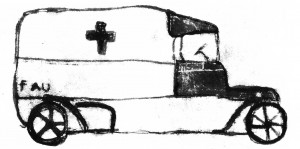Marking the centenary of conscription we offer this the first of a two part article on the centenary of conscription in Britain.
On 27 January 1916 the Military Service Act received the Royal Assent and became law, though to its credit, the law in Britain included a “Conscience Clause” whereby men who were called up could seek exemption from military service. Nearly 20,000 men refused conscription during that terrible war which claimed the lives of many millions of men, women and children.

Friends Ambulance Unit Credit: Rebecca Lanyon
Conscription in Britain however did not emerge out of nowhere. Following the Boer War, in 1902, as European nations built up conscript armies, Liberal Imperialist George Shee founded The National Service League, with the Duke of Wellington as President and support from Rudyard Kipling. European Socialists broadly supported conscription, arguing that the ruling class was thereby arming the workers for the revolution though English Socialists, being more steeped in the “non-conformist, liberal and humanist traditions” than their continental counterparts, had no such notions. (Boulton, Objection Overruled). The idea began to gain traction in 1906 when Lord Northcliffe, publisher of The Daily Mail, invoking the spectre of invasion, embarked on a campaign for conscription. With the Conservative victory of 1910 support for conscription in Parliament multiplied. Parliamentary debates on conscription took place in 1912 and 1913. But in the first months of war in 1914, as is well known, hundreds of thousands of men volunteered. It was not until mass casualties began to mount up and numbers of volunteers dropped off that the government moved toward introducing conscription.
Moves in this direction began in earnest with the passage of the National Registration Bill in July 1915. The requirement for men to register was widely seen as the Trojan Horse that would inevitably bring compulsion, as the Independent Labour Party’s leading Foreign Affairs Spokesman Philip Snowden MP warned.
Recruitment posters put heavy pressure on men to “Volunteer or Be Fetched”, implying that those who were conscripted would be sent to the front lines, while recruiting committees used the details assembled through registration to coerce individuals to join up. A final effort to determine whether voluntary recruitment would meet the needs of the British Expeditionary Force was put in place in the autumn of 1915. The Derby Scheme was run by Kitchener‘s new Director General of Recruiting, Edward Stanley, 17th Earl of Derby (1865-1948). [1] Derby required eligible men aged 18 to 41 to make a public declaration as to his willingness to serve. Since there was seen to be an insufficient number of men willing to volunteer, this gave the conscriptionists the ammunition they required to demand conscription.
The Military Service Act came into effect in January 1916. Single men who were not in work of national importance were deemed to have enlisted in the army. It was only a matter of months before a Military Service (General Compulsion) Bill was introduced, drafting married men as well. By April a further bill raising the upper age limit to 51, and making provision for the conscription of men as old as 56, was passed. Quaker and ILP MPs succeeded in winning the inclusion of a “Conscience Clause” whereby men with a conscientious objection to military service could seek an exemption. The clause was sufficiently ambiguous that the Tribunals implementing the Act would ultimately send thousands of objectors to prison.
Opposition to conscription was strong in Britain and well organised. It was especially strong in Scotland, particularly in Glasgow where the Clyde Workers Committee was formed in 1915 and took repeated industrial action aimed at stopping any moves toward industrial conscription – that is, the requirement to do work towards the military effort. In November of 1915 Fenner Brockway, editor of the Labour Leader, published a letter inviting men, who “were not prepared to take the part of a combatant”, to send their names for purposes of organising opposition to imminent conscription. Thus was born what would become the most effective and well organised peace organisation in British history, the No Conscription Fellowship. The National Committee of the NCF was chaired by Clifford Allen. One of its principal organisers would be the eminent philosopher Bertrand Russell. The bulk of its members were ILP Socialists with Quakers forming the second largest group out of a total of some 10,000 members.
The Act allowed for absolute exemption, alternative civilian service, or conditional exemption whereby men were to serve as non-combatants. In their Declaration on the War Quakers “saw danger to principle in undertaking any service auxiliary to warfare which involves becoming part of the military machine.” The NCF leadership at first emphasised only objection to combatant service. But Brockway and Allen soon moved to the Quaker view and the National Committee took a stand against any service, combatant or alternative. A substantial minority of NCF members however did not go so far and “the question of alternative service divided the Fellowship throughout its life. “
Brian Larkin

